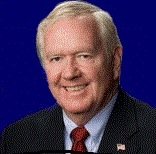
Sen. Steve Fitzgerald of Leavenworth, a Republican, represents the 5th District, which includes the Piper area of Kansas City, Kan.
Fighting over school dollars
Since its inception in 1992 the Kansas school finance formula has been a matter of contention in the courts. It has fueled both an ever increasing amount of money going to the school districts and constant lawsuits for even more money. And, why not? The lawyers suing the taxpayers are paid with tax dollars that are allocated for education.
At 49.2 percent Kansas is now third in the nation (up from fourth) for the percentage of budget that is allocated to K-12 education, far ahead of Massachusetts at 19.4 percent. Number two in the nation is Alabama at 51.3 percent. Continuing with the old formula would soon have us at number one in the nation – which could actually happen even with the new funding grants that are being adopted.
Educational achievement is another story. In virtually every category there has been little or no improvement in overall scores while every measure of spending is up or way up. There are many factors at play and money is only one.
Last year the legislature put $130 million into the school formula for equalization of school funding (helping poor districts) and two notable things happened. The amount became $200 million almost immediately but the legislature was not informed until months later – just the way the formula works. The formula also gave Johnson County schools $55 million of the money because of their poverty.
Meanwhile, other districts are struggling with funding shortfalls. Just because more money goes into the top does not mean that it gets to the districts that need it or to the classrooms and teachers that deserve it.
Money allocated for education has been going into the bank. Cash reserves of the school districts overall have been growing to embarrassing levels. There are many reasons for keeping reserves, but in many cases the increase has been significant. In the last four years the amount of money going to the school has been going up, the amount of money going into the district banks has been going up and the amount going to the lawyers suing for even more has been going up. The taxpayers are paying, excellent and good teachers are not getting the monetary recognition they deserve, and student achievement is stagnant. Something had to change.
Historically, Kansas schools have produced excellent students, good students, and other students. Teachers have a great effect on students; we commend them constantly and it is well deserved.
Poor teachers should be seeking other employment and it should not be difficult to help them on their way. Last year the legislature ended state mandated “tenure” for teachers and gave school districts more latitude in releasing under-performers. A bill in the legislature would help reward top performing teachers with significant monetary awards. But, it is not the role of the legislature to determine teacher pay – that belongs to the local school boards.
School boards like the old formula; they want more money. Teacher unions want more money. Well, to be fair, everyone wants more money. Not everyone can claim to have death grip on the future of the children – so the demands of the school-union group get a lot of attention and respect. Everyone wants the kids to have a good education and the best shot possible – everyone.
But, those questioning the costs are vilified as children haters, etc. The messages get pretty intense. Nonetheless, the legislature is passing a bill to stop using the old formula and go to block grants for the next few years while the funding issue is re-examined.
The absolute need for a change is convincing enough that legislators in both houses recognize that a complete overhaul is needed and “just give them more money” is not the answer that the teachers, the children, the parents, or the taxpayers deserve. A new look that will better allocate funds to actually result in better recognition of teaching excellence and increased student achievement is needed.
